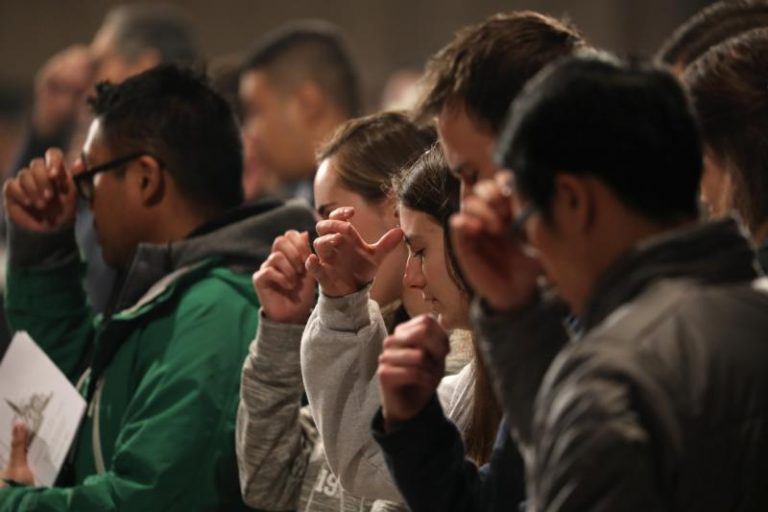By James R.A. Merrick
Dr. James R. A. Merrick is Lecturer at Franciscan University of Steubenville, Reviews Editor for Nova et Vetera, Theology & Latin Teacher at St. Joseph’s Catholic Academy in Boalsburg, Pennsylvania, and on the faculty for the Diocese of Altoona-Johnstown’s Lay Ecclesial and Diaconal formation program. Previously he was Scholar-in-Residence at the St. Paul Center for Biblical Theology. Follow Dr. Merrick on Twitter: @JamesRAMerrick.

What would it be like to encounter God unveiled, face-to-face? Oh, we might say piously, it would be so wonderful, so glorious, I cannot wait! Would it? Should you? Of course, God is glorious and wonderful as well as our greatest Good, so considered objectively we cannot but say “yes.”
But would we experience God’s glory this way in our present state? A whole lot of Scripture indicates a face-to-face encounter with God would be quite dreadful, even devastating for us. Perhaps the veiling of God is a mercy, giving us the distance and time necessary for proper preparation for the beatific vision.
When we recognize our unreadiness for God’s glory, we can engage much more actively the first bits of the Mass, and thereby fulfill the intentions of Vatican II. Let’s consider the Preparation of the Mass—you can read about the Liturgy of the Word in an earlier post.
Our Salvation Comes with the Preservation of God’s Name
The Preparation and Mass commence with the priest calling upon the Name of God, Father, Son, and Holy Spirit. This should give us serious pause. The Name of the Lord should not be used like any other. It should not be invoked carelessly but cautiously.
Over and over, the Scriptures tell us God acts for His Name. God is zealous for His Name. He will not allow it to be profaned. He both saves and judges out of concern for His Name. When the Psalmist reflects on why God liberated the Israelites from Egypt, he makes plain it wasn’t because of the Israelites need or worthiness. Rather, “He saved them for His Name’s sake, that He might make known His mighty power” (Psalm 106:8).
The prophet Daniel, writing while Israel was being judged similarly through exile in Babylon for profaning God’s Name, recognized this biblical pattern: “And now, O Lord our God, who didst bring Thy people out of the land of Egypt with a mighty hand, and hast made Thee a Name, as at this day, we have sinned, we have done wickedly” (Daniel 9:15). When he moves to ask God for a new liberation of Israel, a restoration of the Israelites from Babylonian exile, he asks that God would once more act for the sake of His name:
O my God, incline thy ear and hear; open Thy eyes and behold our desolations, and the city which is called by Thy Name; for we do not present our supplications before Thee on the ground of our righteousness, but on the ground of Thy great mercy. O Lord, hear; O Lord, forgive; O Lord, give heed and act; delay not, for Thy own sake, O my God, because Thy city and Thy people are called by Thy Name. (Daniel 9:18-19)
And so as the prophet Isaiah prophecies the coming Messiah and the reason for Israel’s exile in Babylon, he writes:
For my name’s sake I defer my anger,
for the sake of my praise I restrain it for you,
that I may not cut you off.
Behold, I have refined you, but not like silver;
I have tried you in the furnace of affliction.
For my own sake, for my own sake, I do it,
for why should my name be profaned?
My glory I will not give to another. (Isaiah 48:9-11)
This very brief survey of Sacred Scripture could be amplified, but it is sufficient to show that our salvation comes as God’s Name is preserved.
Hallowed Be Thy Name
So when we call upon God’s Name at the outset of the Mass, we are not calling upon a mute, lifeless idol, but the God whose historic deeds herald forth His Name. We are calling upon the One whose Name should be “hallowed,” as we pray in the “Our Father.” We are putting ourselves at risk of violating the second commandment, “Thou shalt not take the Lord’s name in vain.” In that moment, we are becoming people of God’s Name, and so are making ourselves liable to divine judgment. But we are also setting ourselves before the possibility of salvation!
We must ask ourselves, then, in whose name do we attend Mass—ours or Christ’s, the Name at which every knee shall bow and which every tongue shall confess? Are we there principally for ourselves, for our name? Do we pray the Mass to be seen by others, to make a name for ourselves among the parish, to feel good about ourselves? To check off an obligation like a household chore?
Or are we there out of a genuine desire to see God’s Name be hallowed? Do we see it as our duty to praise of the Name of the Lord for the salvation of our family, friends, neighbors, and humankind? Do we recognize that our salvation consists in the preservation of God’s Name? When we call upon God’s Name at Mass, are we hallowing it or hollowing it?
You Might Also Like

In The Eucharist in Scripture, discover God’s plan as it is expressed through the Bible and the Mass. This six-lesson study, presented by Dr. Scott Hahn, will unlock the meaning of covenant, sacrifice, and sacrament as understood in the Bible, from Genesis through Revelation.

